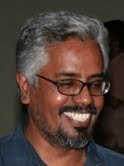VENU NAGAVALLY – THE MELANCHOLIC HERO

Venu Nagavally was not the conventional hero Malayalam cinema was used to till then. He was neither ‘handsome’ like the lyrical-romantic Prem Nazir, nor had Sathyan’S idealist, big-brotherly masculinity. Venu Nagavally belonged to an in-between period in Malayalam cinema, one that came after the era of Sathyan-Nazir duo and before that of Mammooty-Mohanlal. His characters were also never black or white, but endless varieties of grey in between. His screen persona was that of a melancholic hero, that also stood out from the rest of the popular male heroes of his time like Sukumaran, Jayan, Soman etc who exuded a machismo that was totally alien to him.
Another aspect of his personality was versatility and success in many fields: he came to films as a singer (and continued to sing occasionally), and then turned to acting, directing and script writing. Later, he also led the production wing of a television channel.
Though he entered films as a singer in Chottanikkara Amma, it was the late 70’s that Venu Nagavally essayed his major roles, especially in ‘youth/campus films’. It was also a period when Malayalam cinema was at its peak – both economically and thematically. Politically, it was a turbulent and disillusioned period, one that followed the national emergency. In these early films, the narratives of which almost invariably ended tragically, he played the role of the brooding, romantic hero, one who was vulnerable and lovable (Ulkkadal, Shalini Ente Koottukari -1978, Yavanika, Chillu, 1982, Lekhayude maranam oru flashback 1983). His was a persona that reflected the existential and political angst of the post-70’s Kerala youth, who were finding themselves in between many things. The feudal certainties and the idealistic anchorings of the earlier era were already behind them, yet they had not been able to find a new sensuality and expression of their own. Obviously, he was never a ‘hero’ in the conventional sense of the term – one who was extrovertly courageous, handsome and athletic. He was the opposite of all this. He was a desperate lover who had only himself to offer to the world. He was not the one to fight and agress, but to suffer, not one to rave and rant, but one who is brooding and silent, not the lover who fought his way to win his love, but one who would rather suffer his way to the end and never forget. A fatal streak always ran through the love-relationships his characters got or found themselves in. Sometimes the presence of an intimidating father inhibited their being, or they were too self-engrossed and drank themsleves into a stupor. But they were always ready to sacrifice their lives for others. Such total self-denial seems to have had its resonance in his personal life too..
His acting career ran parallel to that of ace directors of the 80’s, especially K G George and Mohan in whose films he played major roles. Their retreat from the scene was also the demise of the kind of ’middle’ cinema that found in Venu its alter ego. Other significant roles in his acting career include those in Vartha (1986), Oru Katha Oru Nunnakkatha (1986) Sunil Vayassu 20 (1986), Adhyayam Onnu Muthal (1985), Ente Ammu Ninte Thulasi Avarude Chakki (1985) ,Meenamasathile Sooryan (1985), Uyarukm Njan Nadaake (1985), Arante Mulla Kochu Mulla (1984), Adaminte Variyellu (1983) and April 18 (1983)
It was only natural that his acting career reached its apogee with the lead role of the eponymous hero of Devdas (1989), which was a sort of rounding off of a period in his career. From there, he moved on towards playing ‘senior’ roles and to direction and scripting. The superhit Priyadarshan movie Kilukkam stands testimony to Venu’s success as a script-writer and prove that beneath the veneer of melancholy ran a strong current of humour.
Venu's first directorial venture was Sukhamo Devi (1986) which was based on his own experience. He went on to direct successful yet sensitive movies like Sarvakalasala, Ayitham(1987), Swagatham (1989), Lal Salam, Aye Auto (1990), Kalipattam, Aayirappara (1993), Agnidevan (1995), Rakthasakshikal Zindabad (1998)and finally Bharya Swantham Suhruthu (2009). All his films were about love and friendship, its confrontation with different kinds of barriers, and the aftermath. In many a film, one can find strong male bondings; right from his first film it continues on to his ‘communist’ films.
His oeuvre also had a strain of his left leanings – apart from acting in films like Meenamasathile Sooryan about the Kayyur revolt, and heading the production wing of a pro-left television channel, two of the films he directed - Lal Salam (1990) and Raksthasakhikal Zindabad (1998) – were an introspective look at the rise and fall of communist ideals. It is the story of a movement gradually becoming a party and getting embroiled in power politics. Venu examines these issues by dealing with the cracks that political movements, its hopes and later degeneration, create in human relationships.
One significant aspect of Venu Nagavally’s screen persona is that, despite the fact that he acted only in a handful of films during the span of two decades, his image tends to stay in our minds unlike many of the other male heroes of his time. In a way, he is more of a haunting presence, rather than an actor per se. Obviously, there was something about his persona that was essentially ‘educated, middle class, malayalee’ that struck a deep chord within us. It combines within itself a curious mix of enchantment as well as resignation, yearning as well as withdrawal, all adding a peculiar charm or charge to his melancholy.
Labels: malayalam cinema, venu nagavally


0 Comments:
Post a Comment
Subscribe to Post Comments [Atom]
<< Home